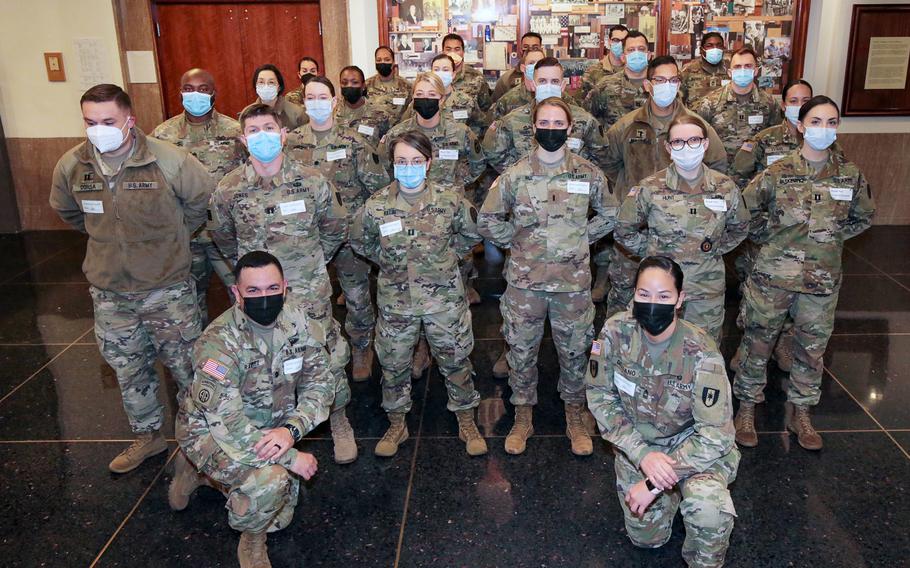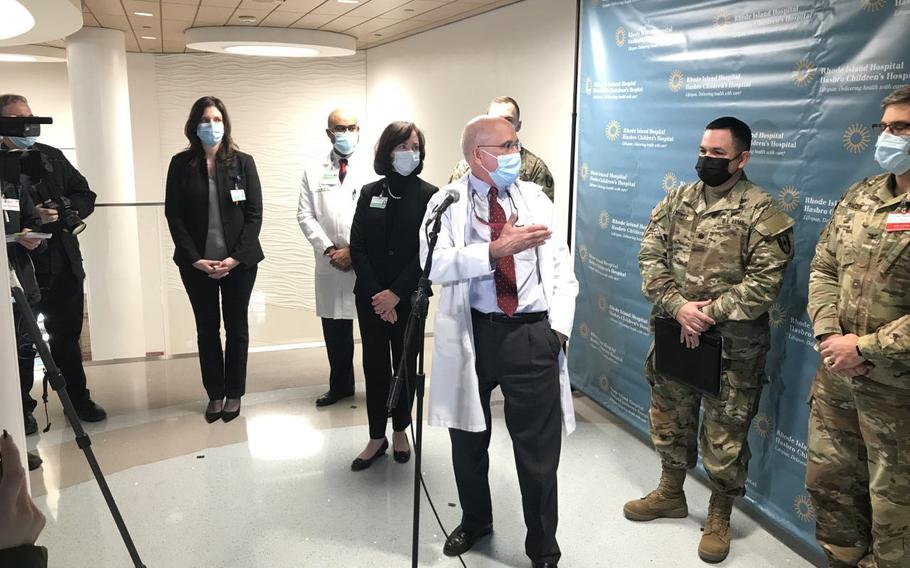
A team of military medical personnel has landed at Rhode Island Hospital to bolster the hospital's response to surging COVID infections. (The Providence Journal/TNS)
Stars and Stripes is making stories on the coronavirus pandemic available free of charge. See more stories here. Sign up for our daily coronavirus newsletter here. Please support our journalism with a subscription.
PROVIDENCE, R.I. (Tribune News Service) — Just days into a month-long deployment to Rhode Island Hospital, a military medical team is already making a difference in helping to treat a surge in the number of coronavirus patients caused by the spread of the omicron variant.
"The 30-day mission is incredibly important to us because we are just past the peak in the surge and our numbers are beginning to decline," Dr. Saul N. Weingart, hospital president, said Wednesday. "So this is exactly the right time when our staff needed the help."
The 23-person team of mainly Army personnel began their assignment on Saturday. The contingent includes three doctors, more than a dozen nurses and a pair of respiratory technicians. They have been spread out among intensive care and surgical units and the emergency department, where they are working side-by-side with hospital staff.
The team's current deployment is for a 30-day period, but it may be extended another 30 days if the need continues.
President Joe Biden announced earlier this month the federal government's decision to send aid to Rhode Island Hospital as well as to hospitals in five other states overwhelmed by the COVID pandemic. The other states are New York, New Jersey, Ohio, Michigan and New Mexico.
Rhode Island Hospital has seen an eight-fold increase in COVID patients since early November, said Weingart, while at the same time losing staff to the virus and to voluntary departures. Staffing has been as much as 35% below normal.
The hospital has tried to address the situation by combining units, postponing elective procedures and repurposing workers. But the staffing shortage has meant that about 100 beds are out of service.
With the help of the military team, the hospital has been able to bump up the number of intensive care unit beds available to patients and the number of operating rooms, though it's still well short of capacity in both areas.

Rhode Island Hospital president Dr. Saul N. Weingart thanks a military medical team for the help it has provided in treating a surge in coronavirus patients. (The Providence Journal/TNS)
Most of the military personnel are assigned to the respiratory intensive care unit, which is primarily treating coronavirus patients.
Lt. Col. Edgardo Ramirez, commander of the team from the Army's 44th Medical Brigade, said he and the other members have felt welcomed by the staff at Rhode Island Hospital.
"We are in this together, and we will do everything we can to assist the local community and assist the team here in Rhode Island to do the best we can," he said.
Conditions in the hospital's intensive care unit are no different from units elsewhere, said Capt. Nicholas Law, a critical care nurse. The biggest challenges have been logistical - knowing where medical supplies are kept and mastering the hospital's electronic records system.
"We're just trying to learn the intricacies of that so we can be as fast as the Rhode Island Hospital nurses are," Law said.
One place where the addition of the team is being felt is in the emergency department, where wait times for patients have been reduced, said Cynthia Danner, chief nursing officer for the hospital.
"They're helping to triage those patients so we can get them to the appropriate place," she said.
The help from the military hasn't solved all of the hospital's problems and there's still a long way to go before the staffing shortage goes away.
"This is a national problem. It's not just a Rhode Island problem," said Dr. Dean Roye, the hospital's chief medical officer. "And it's going to take national solutions to address it across the country. We really need to fix the pipeline. We need to get an influx of nurses. We need to get an influx of other health-care professionals. But it's going to be a long, long time before we get back to normal."
For now, though, there's been relief among hospital staff at getting the help from the military team and seeing the expertise its members offer.
"There's been a significant emotional lift from having these capable clinicians working with us and helping us to care for patients," Weingart said.
©2022 www.providencejournal.com.
Visit providencejournal.com.
Distributed by Tribune Content Agency, LLC.